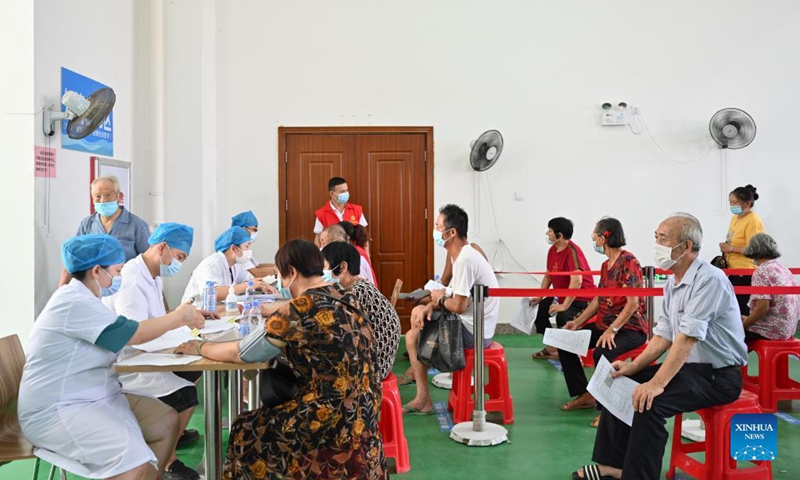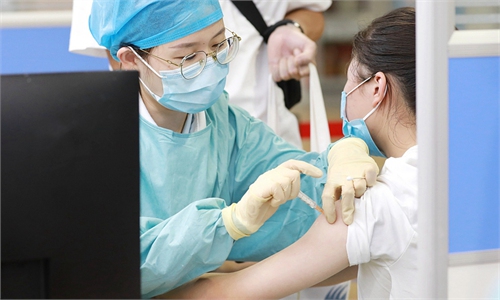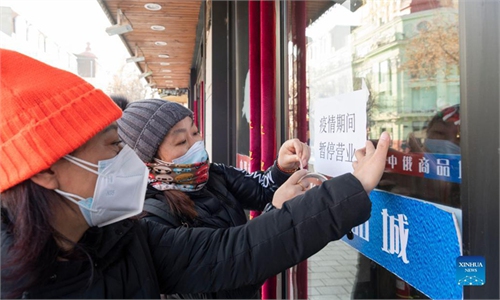Experts call for intensified effort to have elderly people vaccinated amid fresh COVID-19 epidemic resurgence
Experts call for intensified effort to have elderly people vaccinated

Elderly people from local villages queue up to get their blood pressure measured before receiving COVID-19 vaccines in Neikeng Town in Jinjiang, East China's Fujian Province, August 31, 2021. Photo: Xinhua
Experts called for an intensified effort to have elderly people vaccinated as the latest COVID-19 epidemic resurgence that started from Manzhouli of North China's Inner Mongolia Autonomous Region has already affected four other provincial regions including Beijing, with infections surpassing 400.In spite of mounting challenges brought by the cold weather, and the emergence of mutated variants and non-stop epidemics overseas, China is capable of tackling the latest flare-up one more time, experts said.
But the huge pressure of preventing imported cases and a rebound of locally transmitted cases also highlights the necessity and urgency for a larger proportion of people to get vaccinated, especially those above 60 years old, who are believed to be more susceptible, they noted.
On Monday, a total of 60 new domestically transmitted cases were reported, 55 of whom were in Hulunbuir, also in the Inner Mongolia Autonomous Region, two from the capital city of Northeast China's Heilongjiang Province, another two from Southwest China's Yunnan and one more from East China's Zhejiang's Ningbo.
Since November 27, when an infection was first detected in Manzhouli, the number of infected people associated with this round of the epidemic has spread to Heilongjiang, Beijing and Hebei, with the total infections associated with this round of domestic flare-ups rising to 457 people as of Monday.
Besides the epidemic related to Manzhouli, there were also infections involving locally transmitted cases detected in Zhejiang, Shanghai and Guangdong and Yunnan.
Epidemics that come one after another are normal in the face of challenges brought by the Delta variant, cold weather and the prevalent epidemic overseas, Wang Guangfa, a respiratory expert at Peking University First Hospital, told the Global Times.
Zeng Guang, former chief epidemiologist of the Chinese Center for Disease Control and Prevention, told the Global Times on Tuesday that despite the challenges, China still has the confidence to overcome it.
"With the arrival of more challenges, such as the Omicron variant, China has accumulated more experience in tackling the COVID-19 epidemic," he said, asking the public not to over-react to the emerging epidemic.
With the current dynamic zero-case policy, which has been proved effective and guards the country going through rounds of epidemic resurgences, China is one of the countries having the lowest number of infections and achieving a robust economic recovery, Zeng said.
But it is a fact that difficulties lie in front of China when the epidemic overseas is not being curbed, and there are always hidden points in daily epidemic prevention that could cause fresh flare-ups, experts noted.
Wang noted that while China implements the dynamic zero-case policy well to guard against imported cases and control fresh flare-ups, the acceleration of vaccinations is essential to reduce the number of patients with severe symptoms, especially among seniors who are more susceptible to contracting the virus.
"If we do not accelerate the vaccination of seniors, once the epidemic controls are relaxed, their high rates of severe illness and death will be unacceptable, causing China's medical resources to inevitably be severely squeezed and leading to social problems," Zheng Zhongwei, head of China's COVID-19 vaccine development task force, said recently.
Some 50 million elderly people haven't received vaccines so far, accounting for 20 percent of the total number of people over 60 in China. That number is equivalent to the population of a medium-sized country, according to Zheng.
Data related to epidemics in Guangdong and Jiangsu provinces proved that the risk for vaccinated seniors of having severe symptoms is much lower than those who are unvaccinated, and among patients with severe conditions, 90 percent hadn't received vaccines, said Zheng.
Renowned respiratory expert Zhong Nanshan recently also encouraged seniors to get vaccinated, saying now 75.8 percent of the people in China have been fully vaccinated but to reach herd immunity, the vaccination rate should reach 83 percent, thus the vaccination of seniors is essential.

Elderly people from local villages queue up to get their blood pressure measured before receiving COVID-19 vaccines in Neikeng Town in Jinjiang, East China's Fujian Province, August 31, 2021. Photo: Xinhua
Experts called for an intensified effort to have elderly people vaccinated as the latest COVID-19 epidemic resurgence that started from Manzhouli of North China's Inner Mongolia Autonomous Region has already affected four other provincial regions including Beijing, with infections surpassing 400.In spite of mounting challenges brought by the cold weather, and the emergence of mutated variants and non-stop epidemics overseas, China is capable of tackling the latest flare-up one more time, experts said.
But the huge pressure of preventing imported cases and a rebound of locally transmitted cases also highlights the necessity and urgency for a larger proportion of people to get vaccinated, especially those above 60 years old, who are believed to be more susceptible, they noted.
On Monday, a total of 60 new domestically transmitted cases were reported, 55 of whom were in Hulunbuir, also in the Inner Mongolia Autonomous Region, two from the capital city of Northeast China's Heilongjiang Province, another two from Southwest China's Yunnan and one more from East China's Zhejiang's Ningbo.
Since November 27, when an infection was first detected in Manzhouli, the number of infected people associated with this round of the epidemic has spread to Heilongjiang, Beijing and Hebei, with the total infections associated with this round of domestic flare-ups rising to 457 people as of Monday.
Besides the epidemic related to Manzhouli, there were also infections involving locally transmitted cases detected in Zhejiang, Shanghai and Guangdong and Yunnan.
Epidemics that come one after another are normal in the face of challenges brought by the Delta variant, cold weather and the prevalent epidemic overseas, Wang Guangfa, a respiratory expert at Peking University First Hospital, told the Global Times.
Zeng Guang, former chief epidemiologist of the Chinese Center for Disease Control and Prevention, told the Global Times on Tuesday that despite the challenges, China still has the confidence to overcome it.
"With the arrival of more challenges, such as the Omicron variant, China has accumulated more experience in tackling the COVID-19 epidemic," he said, asking the public not to over-react to the emerging epidemic.
With the current dynamic zero-case policy, which has been proved effective and guards the country going through rounds of epidemic resurgences, China is one of the countries having the lowest number of infections and achieving a robust economic recovery, Zeng said.
But it is a fact that difficulties lie in front of China when the epidemic overseas is not being curbed, and there are always hidden points in daily epidemic prevention that could cause fresh flare-ups, experts noted.
Wang noted that while China implements the dynamic zero-case policy well to guard against imported cases and control fresh flare-ups, the acceleration of vaccinations is essential to reduce the number of patients with severe symptoms, especially among seniors who are more susceptible to contracting the virus.
"If we do not accelerate the vaccination of seniors, once the epidemic controls are relaxed, their high rates of severe illness and death will be unacceptable, causing China's medical resources to inevitably be severely squeezed and leading to social problems," Zheng Zhongwei, head of China's COVID-19 vaccine development task force, said recently.
Some 50 million elderly people haven't received vaccines so far, accounting for 20 percent of the total number of people over 60 in China. That number is equivalent to the population of a medium-sized country, according to Zheng.
Data related to epidemics in Guangdong and Jiangsu provinces proved that the risk for vaccinated seniors of having severe symptoms is much lower than those who are unvaccinated, and among patients with severe conditions, 90 percent hadn't received vaccines, said Zheng.
Renowned respiratory expert Zhong Nanshan recently also encouraged seniors to get vaccinated, saying now 75.8 percent of the people in China have been fully vaccinated but to reach herd immunity, the vaccination rate should reach 83 percent, thus the vaccination of seniors is essential.


